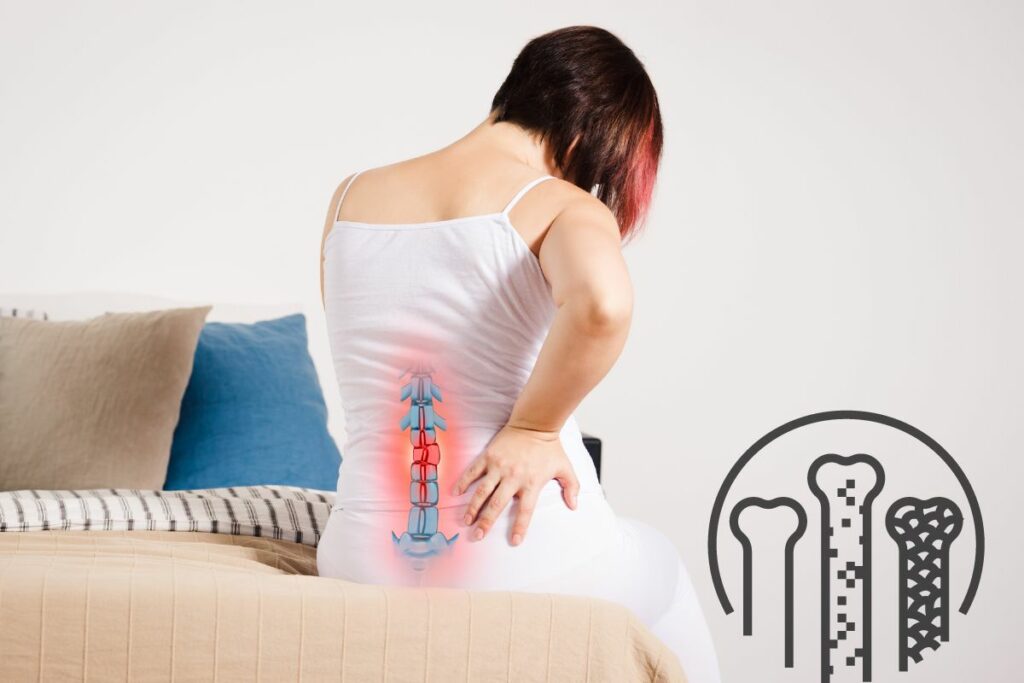Perimenopause In Your Forties? What You Should Know
When I hit my early forties and my body started changing, I couldn’t believe it. Perimenopause? Already?
Like most women, I assumed menopause was something that happened in my fifties, so when the symptoms showed up at 44, I was completely caught off guard.
I remember sitting in my doctor’s office, convinced I was way too young for this. He assured me that I wasn’t.
As unsettling as it is to start perimenopause early, my doctor mentioned that, on rare occasions, he’s had women in their 60s coming in, frustrated and wondering why they’re still getting their periods.
That definitely made me rethink things—imagine being well past 60 and still dealing with that! (Yikes!)
I also learned the transition can last up to 10 years, so if you’re noticing changes and wondering if perimenopause is to blame, you’re definitely not alone.
I want to make sure you understand what’s happening and what to expect.

This post may contain affiliate links, which helps keep this content free. Please read our disclosure for more info.
What Is Perimenopause?
Perimenopause is the transitional phase leading up to menopause, and during this time, your body gradually reduces the production of key reproductive hormones like estrogen, progesterone, and even testosterone.
Menopause itself officially starts when you haven’t had a period for 12 months, but perimenopause can last for several years before that point, sometimes up to a decade.
In my case, perimenopause began in my mid-forties, but for some women, it can start as early as their late-thirties or as late as their fifties, making it impossible to predict when it will happen for any one person.
Most discussions about perimenopause focus on the fluctuations in estrogen and progesterone, but testosterone also plays a significant role.
While it’s commonly thought of as a male hormone, women produce small amounts of testosterone, and it affects energy levels, libido, and mood.
As all three of these hormones start to shift and decline, you might notice a wide range of symptoms, like irregular periods, mood swings, or changes in energy.
During perimenopause, estrogen levels tend to drop unevenly, which can lead to the infamous hot flashes and night sweats.
Progesterone, which helps regulate your cycle, also declines, contributing to those unpredictable periods and sometimes heavier or lighter bleeding than you’re used to.
Meanwhile, testosterone levels can fall gradually, leading to subtle changes in your muscle tone, energy, and sexual drive.
These fluctuations can last anywhere from a few months to several years, depending on your body, and are the driving force behind the common symptoms we associate with “the change.”
It’s important to understand that all three hormones—estrogen, progesterone, and testosterone—are working together, and when they become unbalanced, it impacts everything from your mood to your metabolism.
Common Symptoms of Perimenopause

If you’re in your forties and noticing things feel a little off, there’s a possibility you’re starting perimenopause. The symptoms can vary widely from person to person, but here are some of the most common signs to look out for:
- Irregular Periods: Your cycle might start to become unpredictable. For me, my periods lengthened and shortened in odd patterns before finally stopping altogether. The flow was all over the place too—sometimes light, and other times much heavier than I was used to.
- Hot Flashes and Night Sweats: One of my earliest and most noticeable symptoms. I remember waking up in the middle of the night drenched in sweat, feeling like I was overheating for no reason. Hot flashes can also hit during the day, leaving you feeling like your body is on fire.
- Mood Swings: The hormonal fluctuations during perimenopause can wreak havoc on your emotions. I had moments of feeling unusually irritable or anxious, even when nothing seemed to trigger it.
- Sleep Disruptions: Insomnia is a frustrating part of perimenopause for many women. Even when I felt exhausted, falling asleep or staying asleep became a challenge.
- Fatigue: As your hormones shift, you might feel more tired than usual, even after getting a full night’s sleep. This sense of ongoing fatigue can make it harder to keep up with daily tasks.
- Weight Gain: Changes in metabolism often lead to weight gain, especially around the abdomen. It can feel like your body is holding onto weight despite eating and exercising the same as before.
- Decreased Libido: You might notice a drop in sexual desire. This is tied to hormonal changes, including the decline in testosterone, which affects libido in women.
- Vaginal Dryness and Discomfort: Lower estrogen levels can lead to vaginal dryness, itching, and discomfort, which can make sex more uncomfortable or even painful.
- Breast Tenderness: Some women experience tenderness or pain in their breasts as a result of fluctuating hormone levels.
- Urinary Issues: You might find yourself dealing with more frequent or urgent urination, or even urinary incontinence, which can be linked to the decline in estrogen affecting bladder function.
- Changes in Hair and Skin: Some women notice that their skin becomes drier or that their hair starts to thin or become more brittle as hormone levels decline.
- Difficulty Concentrating and Memory Issues: Sometimes referred to as “brain fog,” you might find it harder to focus or remember things as you go through perimenopause.
These symptoms can come and go over time and may last for several years. While some days might feel perfectly normal, others can feel like a rollercoaster, so it’s important to be aware of these changes and understand that they’re a natural part of the process.
How Perimenopause Impacts Your Body in Your Forties
Perimenopause involves more than just irregular periods and hot flashes; it can have lasting effects on your overall health. Understanding how perimenopause impacts your body and taking steps to address these changes can help you maintain long-term health and well-being.
Bone Health

As estrogen levels drop during perimenopause, your bone density can decrease, increasing the risk of osteoporosis. Estrogen plays a critical role in keeping bones strong, so the loss of this hormone can weaken bones and heighten the chances of fractures, particularly in the hips, spine, and wrists.
How to Combat It:
- Calcium and Vitamin D: Boost your intake of calcium-rich foods like dairy, leafy greens, and fortified foods. Vitamin D helps with calcium absorption, so make sure you’re getting enough, either through sunlight or supplements.
- Weight-bearing Exercises: Strengthen your bones by incorporating weight-bearing exercises like walking, hiking, and resistance training into your routine. These activities stimulate bone growth and help maintain density.
- Bone Density Tests: If you have a family history of osteoporosis or other bone-related issues, talk to your doctor about getting a bone density scan to track your bone health and consider medications if needed.
Heart Health
Estrogen also helps protect your heart, so when levels decline, your risk for cardiovascular disease may increase. Lower estrogen can affect cholesterol levels, cause blood pressure to rise, and reduce the elasticity of blood vessels, making heart health an important focus during perimenopause.
How to Combat It:
- Heart-Healthy Diet: Focus on a diet rich in fruits, vegetables, whole grains, and healthy fats, such as those from fish, nuts, and seeds. Reducing processed foods, sugars, and unhealthy fats can help keep cholesterol and blood pressure in check.
- Regular Exercise: Aim for at least 150 minutes of moderate exercise per week, such as brisk walking, swimming, or cycling, to improve heart health and maintain cardiovascular fitness.
- Medical Monitoring: Schedule regular check-ups to monitor your blood pressure, cholesterol, and glucose levels. Catching issues early makes a big difference in long-term heart health.
Weight Gain

Many women notice weight gain during perimenopause, particularly around the midsection. This is largely due to hormonal changes that slow down metabolism.
The drop in estrogen makes your body more prone to storing fat, while declining testosterone can lead to a loss of muscle mass.
Together, these factors make it harder to maintain your previous weight, even if your diet and exercise habits haven’t changed.
How to Combat It:
- Balanced Diet: Pay attention to portion sizes and focus on nutrient-dense foods. Prioritize protein, healthy fats, and fiber, which can help control hunger and maintain muscle mass.
- Strength Training: Incorporating resistance exercises such as lifting weights or using bodyweight resistance is key to preserving muscle mass and boosting metabolism.
- Cardio Exercise: Adding regular cardio to your routine—such as walking, jogging, or swimming—can help burn calories and keep excess weight at bay.
Skin and Hair Changes
As estrogen declines, many women notice changes in their skin and hair. Skin can become drier, thinner, and less elastic, while hair may start to thin or become more brittle. This is due to the reduced production of collagen and natural oils that are typically supported by estrogen.
How to Combat It:
- Hydration and Moisturizing: Keep your skin hydrated by drinking plenty of water and using a good moisturizer. Look for products with hyaluronic acid, ceramides, and peptides, which can help retain moisture and improve skin texture.
- Collagen Supplements: Consider adding collagen supplements to support skin elasticity and hair strength.
- Gentle Hair Care: Avoid harsh hair treatments, heat styling, and excessive washing, which can dry out hair further. Opt for gentle, moisturizing shampoos and conditioners.
Cognitive Function
“Brain fog” is a common complaint during perimenopause. The decline in estrogen can affect neurotransmitters linked to memory and focus, making it harder to concentrate or remember things.
How to Combat It:
- Mental Stimulation: Stay mentally active by engaging in challenging activities like puzzles, reading, or learning a new skill. Keeping your brain engaged helps strengthen cognitive function.
- Exercise: Physical activity doesn’t just benefit your body—it’s also great for your brain. Regular exercise increases blood flow to the brain and supports cognitive health.
- Good Sleep Hygiene: Rest is essential for brain health. Establish a regular sleep routine, avoid caffeine late in the day, and create a relaxing pre-bedtime ritual to improve sleep quality.
Emotional and Mental Health
Hormonal fluctuations during perimenopause can lead to emotional changes such as irritability, anxiety, and depression. The rollercoaster of moods can be challenging and may impact your mental well-being.
How to Combat It:
- Stress Management: Practice stress-reducing techniques like meditation, deep breathing, or yoga to help balance your emotions.
- Stay Connected: Keep in touch with friends, family, or a support group to avoid feeling isolated. Sharing your experiences with others who understand can be very reassuring.
- Seek Professional Help: If mood swings, anxiety, or depression are severe or persistent, talk to a healthcare provider. Therapy or medication may help in managing emotional health during this time.
Urinary and Pelvic Health
The drop in estrogen during perimenopause can affect the urinary tract and pelvic muscles, leading to urinary incontinence or increased urgency.
How to Combat It:
- Pelvic Floor Exercises: Strengthening your pelvic floor muscles with exercises such as Kegels can help improve bladder control.
- Stay Hydrated: Drinking enough water can help prevent urinary tract issues, but avoid diuretics like caffeine if you’re experiencing frequent urination.
- Consult a Specialist: If bladder issues persist, consider seeing a pelvic floor specialist for targeted therapy or treatment options.
Taking proactive steps to address the long-term health effects of perimenopause can help you stay healthy and feel better during this transition.
Managing Perimenopause Symptoms

Thankfully, there are plenty of ways to manage perimenopause symptoms and make this transition more manageable:
- Lifestyle Adjustments: The basics really do matter. Eating a balanced diet, staying active, and managing stress can make a significant difference in how you feel. For me, regular exercise was a game-changer, especially when it came to keeping my mood in check and improving my sleep quality. Incorporating strength training can also help counteract some of the muscle loss associated with lower testosterone levels.
- Sleep Hygiene: Getting a good night’s rest can feel impossible when night sweats or insomnia hit. However, creating a consistent sleep routine can help. Keeping the bedroom cool, avoiding screens an hour before bed, and trying calming activities like reading or deep breathing exercises can improve your chances of better sleep. Some women also find using cooling pillows or moisture-wicking bedding helpful in managing night sweats.
- Hormone Therapy: Hormone replacement therapy (HRT) is a popular option for women dealing with severe symptoms. By supplementing your body’s declining hormone levels, HRT can help alleviate everything from hot flashes to mood swings. However, it’s important to discuss the risks and benefits with your doctor, as HRT isn’t for everyone.
- Alternative Remedies: If HRT doesn’t appeal to you, there are natural remedies worth exploring. Herbal supplements like black cohosh or evening primrose oil have been shown to help with some symptoms, particularly hot flashes and mood swings. Additionally, holistic practices like yoga, meditation, or acupuncture can be beneficial for managing stress and improving overall well-being during this time.
When to Talk to Your Doctor
If you think you might be entering perimenopause, it’s a good idea to talk to your doctor and have an open conversation about what you’re experiencing.
I also found that tracking my menstrual cycle with an app was incredibly helpful, especially when I started getting close to that 12-month countdown toward menopause.
I even went 11 months without a period once, only for it to show up out of the blue, unfortunately resetting the countdown! At this point in my journey, I was enjoying the idea of never having another period again, so it was quite frustrating…
You can also track other symptoms like hot flashes, mood swings, and sleep disruptions. This kind of information provides your doctor with a more complete picture of what’s happening with your body.
If you’re feeling uncertain about what’s going on, ask your doctor for a hormone test. For me, having my estrogen, progesterone, and testosterone levels checked was reassuring. It confirmed that I wasn’t imagining things or going crazy—it was perimenopause.
While blood tests aren’t always necessary, they can give you peace of mind and help validate what your body is going through. So, don’t hesitate to ask if you feel like it would help clarify your situation.
Navigating Perimenopause and Taking Control of Your Health
Perimenopause in your forties, or at any age, can feel like a whirlwind of changes, but the more informed you are, the better prepared you’ll be to manage it.
While the transition wasn’t easy for me, understanding what was happening and finding practical ways to handle the symptoms made all the difference.
If you think you might be starting perimenopause, talking to your doctor and creating a personalized plan can help you feel more in control.
One of the best ways to support your health during perimenopause is by focusing on fitness and nutrition, which can help you manage symptoms and avoid the weight gain that often comes with hormonal changes.
Many women in the perimenopause and menopause stages of life have found great success with our 21-Day Fat Loss Challenge program.

It’s specifically designed to help you lose weight, boost your energy, and reset your metabolism, all while fitting into a busy lifestyle.
Whether you’re just beginning your perimenopause journey or already navigating it, taking steps to prioritize your health with a program like this can make the transition much smoother.

